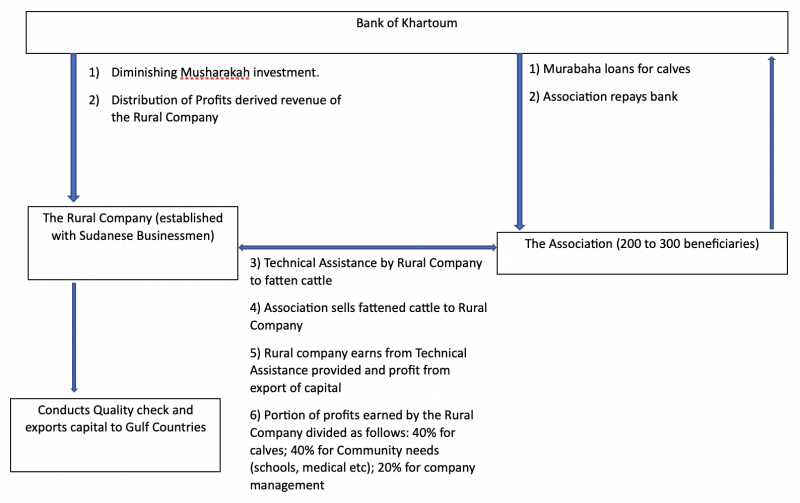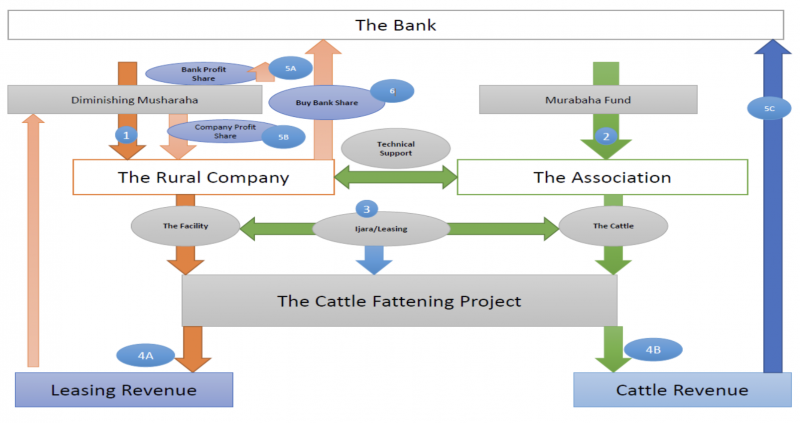Empowering Villagers through Diminishing Musharakah Financing in Wad Balal (Sudan)
Wad Balal Cattle Fattening Project was initiated by a group of educated persons from Wad Balal village living and working abroad, after returning to find out that the village’s economic condition deteriorated and 20% of its population displaced in search of a decent life and job opportunities in other villages. In 2005, these educated persons decided to establish the “Wad Balal Cooperative Association” and this cooperative association had established "Wad Balal Investment and Rural Development Company," a local joint stock company aimed at developing their village. They managed to raise an initial capital and bought 67 acres west of the village to start the work on agricultural projects. Although the first project didn’t succeed, but the local community in Wad Balal didn’t give up and continue to invest and try different types of income-generating businesses, since the founders of this cooperative association decided that instead of just providing aid through cash transfers, they wanted to contribute to the improvement of their village and provide job opportunities for its people.
Wad Balal identified the livestock industry as the one that can create sustainable and high income for the people of the village. In addition, the rural businessmen wanted to use their connections and previous work experiences to supply the Middle East with livestock from Wad Balal. There was a strong demand for beef in the Middle East but to successfully meet the export market standards, they needed to help their suppliers (livestock herders) with the necessary infrastructure and know – how. Project targets production of 7000 heads of cattle, and the expected number of beneficiaries is 250-300 from Wad Balal village.
With this idea, they developed a business plan and approached Bank of Khartoum (BOK) for assistance. The business plan was refined and the BOK board subsequently approved SDG9.30 million (including SDG4.27 million for purchasing calves) for the project based on recommendations in the feasibility study.
The group of businessmen registered the Wad Balal Company with the mission of investing in livestock production assets for the community, as well as to purchase the livestock from the community for export to the Middle East. In addition, they also helped the herders register the Wad Balal Cooperative Association, with the aim of supplying livestock to their company. In this project, BOK made two main contracts: (a) a Murabaha (trade) financing to purchase calves for the Wad Balal Association; and (b) a diminishing Musharaka (decreasing partnership) financing to purchase livestock production assets for the Wad Balal Company. Due to the low educational level and capacity of the members of the Wad Balal Association, the Wad Balal Company was expected to help the association maintain production standards for export. In the first contract, BOK would provide the financing for the purchase of calves for the association. By purchasing in bulk, BOK helped the association to acquire calves at a lower price. The mark-up of the Murabaha was set at 15% per annum. No collateral was provided for the transaction, but the Wad Balal Company agreed to provide a 55% guarantee for repayment of the cattle financing.
In the second contract, the businessmen invested about SDG321,000 (6% of the capital), while BOK invested SDG5.03 million (94% of the capital). The capital was used to purchase fixed assets and alfalfa feed and for other operating expenses. These assets and services were to be leased to the Wad Balal Association at an 18% leasing profit, which was also estimated at 21% of the export sales and 19% of local sales. This leasing profit was to be used to purchase the shares owned by BOK over a period of 5 years, including a 2-year grace period. As Wad Balal Company’s shares increase over time, their share of profits would also increase. True to its social objectives, the Wad Balal Company gave an irrevocable guarantee to utilize their gained profits in the following manner: (a) 40% to purchase more calves for the poor to enable more of them to join the association; (b) 40% for social development projects (e.g. education, medical etc.); and (c) 20% for the management of the company. Under the diminishing Musharaka (decreasing partnership) agreement, the businessmen agreed to mortgage their land as collateral against negligence and mismanagement.
Diagram (1) – Roles and Responsibilities between different Stakeholders in Wad Balal Cattle Fattening Project


Lessons Learnt – BOK as a catalyst for development by creating a Social Business to support a potential sector
As a shareholder of the Bank of Khartoum, IsDB has been successful in creating a mini-development bank in the process. BOK has facilitated the creation of a social business in the form of Wad Balal Company which has the main mandate to strengthen the economy of the poor rural region by strengthening the cattle fattening sector. The Wad Balal Company was created for the benefit of the poor. It had agreed with its shareholders to utilize the profits earned in the following manner: 40% for purchasing calves for Wad Balal Association; 40% for income and profits for shareholders, also it will be used for conducting social development (i.e. CSR activities) in the village; and 20% for the management expenses. This unique model ensured that the maximum benefit from the business will help strengthen the economy in the region in a sustainable manner. Improvement in the lives of the poor was reflected in the study as the majority believed that the projects contributed positively to education, health, women empowerment, and more. This is explained in the following table:
Table (1): Wad Bilal projects impact on rural social development
|
No. |
Question Topic |
Villagers opinions average |
|
1 |
The project increased the family’s income in Wad Bilal village |
Agree |
|
2 |
The project increased the job opportunities in the village |
Strongly agree |
|
3 |
The project improved the education of the village |
Agree |
|
4 |
The project improved the health of the village |
Agree |
|
5 |
The project helped maintain rural resources |
Agree |
|
6 |
The project contributed to the expansion and use of renewable energy |
Neutral |
|
7 |
The project contributed to the women empowerment of the village’s women |
Strongly agree |
|
8 |
The project inspired and encouraged the neighbouring countries to have similar projects |
Agree |
|
9 |
The project helped improve the food security/dietary status of the village |
Agree |
During 2021, an empirical study by the researcher Hossam Ibrahim Mahmoud from the University of Gezira was published, in which he used questionnaires and focus-groups to collect information (information collected in 2019) related to the developmental impact of Wad Bilal project from more than 100 heads of families in the village chosen randomly. The 100 responses were divided into 10 groups chosen randomly. Calculating the average for each group, we found that the projects caused an increase in monthly income for households of 12,273 Sudanese pounds (average) per month or 140,400 Sudanese pounds per year (equivalent to approximately $159 per month or 1,912 dollars per year, given that the average value of one US dollar equals 77,025 Sudanese pounds in 2019). As for calculating the development impact of the projects on the monthly expenditure of families in Wad Bilal village (assuming that calculating the difference in expenditure rates before and after the projects is an accurate indicator), after dividing the responses of the 100 families into 10 groups and calculating the average for each group, we found that the project caused an increase in spending estimated at 20,900 Sudanese pounds per month or 250,800 Sudanese pounds per year (equivalent to approximately $271 per month or $3,256 per year). The following diagrams were extracted from the study. They show the difference in income and expenditure before and after the development projects carried out by the Wad Bilal Company for Rural Development according to the responses of the villagers.